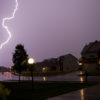Many people enjoy swimming. It is not only a sport but also a recreational activity that anyone can do. You can invite your friends and family over and use swimming to strengthen relationships all year round. Pool safety is mostly common sense with swimmers knowing and following basic rules to stay safe in the water.
While your swimming pool may be an oasis where you can relax in most of the time, it can become hazardous all of a sudden. Shifting weather conditions can present dangers for everyone in a pool, both children and adults.
Storms can happen anytime no matter where you live. There are some lucky areas that do not get hit by hurricanes or thunderstorms as much as Florida and Texas, but all areas experience occasional storms. Pool Troopers provide services in many stormy locales such as Tampa Bay, Houston, and Dallas among others. These places experience heavy rainstorms and other bad weather conditions.
Pool Troopers aims to keep you and your family safe. The goal is to educate you about swimming pools and lightning and how you can implement helpful techniques against possible swimming dangers. Owning a pool in your backyard or even inside your home is something you are proud of. However, if you do not keep yourself updated about pool safety measures, it can lead to potential issues for you or your guests.
During storms and specifically instances of lightning strikes, you may want to know what to do to keep your family safe. Here are some of the most important things to know about:
1. Pool water vs. seawater safety during thunderstorms and lightning
Many people assume that it is safer to swim in their swimming pools compared to saltwater during a storm. Some believe it is the other way around. However, it is NOT safe to swim whenever lightning is likely in your area — period. All types of swimming water are unsafe even if the thunderstorm is taking place a few miles away. That is because lightning can travel many miles away from the edges of a storm. It can hit in areas unaffected by the rest of the storm.
Additionally, water is a very good electrical conductor making it very dangerous during storms with lightning. Saltwater is an even better conductor than pool water. Therefore, if it is stormy and you, your kids, or anyone is in the pool, it is time to get out of the water. Since water conducts electricity so well, there is no safe place in the water during an electrical storm.
Lightning current dissipates in all directions. Even if the first strike was several miles away, you should never put yourself or your loved ones in danger. Anyone in the water is the highest or tallest object in the water and is, therefore, the most likely target of the lightning strike.
2. The Best time to get out of the water
If you are in the pool with your friends, the first time you hear thunder, you should get out of the water fast. The same applies when you see lightning. Make sure that you go inside, surrounded by walls, as an open picnic-type shelter, porch or lanai will not provide you the protection you need during such a lightning storm. Another option is to enter a grounded vehicle.
3. Lightning distance
A common question that people ask regards the location of the lightning relative to the location of the storm. Many pool owners easily misjudge the distance of lightning because it may seem very far away. Estimating the location may seem reasonable because they may have seen where lightning hit.
In a typical situation in a noisy environment, such as in a public place where people talk and vehicles pass by, you cannot hear thunder unless it is a few miles away. If you are in a very quiet area, you will hear the sound when it is up to 15 or even 25 miles away.
When you see lightning at night, in the right conditions it could be as far as 100 miles from your location. During the daytime, lightning is typically visible within 25 miles. You also need to consider whether you heard thunder.
If thunder is heard, it typically means lightning is less than 25 miles from your location, and there have been many instances of lightning strikes 25 miles from the edge of a storm. These stray bolts are sometimes called “Bolts from the Blue” because they happen with blue skies above. This means that if you hear thunder you’re always in the range of lightning.
That does not mean that lightning can’t reach you if you can’t hear thunder, however. If you know a storm is in the area get out of the water even if you don’t hear thunder.
To be entirely safe, Pool Troopers recommends that you stay away from your swimming pool whenever storms are in your area. Usually, lightning threats last around an hour or so. Modern technology allows us to know exactly where storms are in relation to our homes. Therefore, it is best to wait until the danger is over, and confirm with radar that it is no longer near your location.
4. Indoor pools
It is easy to assume that pool safety during lightning and storms is only applicable to outdoor pools. However, indoor swimming pools are also affected. Because of the conductivity of water, you would not want to be swimming in an indoor pool with an electrical storm in your area. An indirect strike to a nearby tree or building could lead to a dangerous current in your indoor pool.
How to Stay Safe in Your Own Backyard
If there is a storm in your area, swimming may be far from your mind. One of the things you should do is to be prepared for the bad weather, and have a stated plan that all the swimmers in your group know. If you live in Florida or Texas, you know how dangerous it is to stay outdoors during a thunderstorm.
However, some people can be difficult to persuade to go inside when there is a storm or even lightning. You want to make sure that everyone gets into a safe place until the threat is over. As mentioned, you may have to wait an hour to guarantee that lightning will not strike again.
Pool safety should always be a priority. During a storm in your area, the first thing to do is to get out of the water. Then follow your Family’s plan for when it is safe to reenter the pool after a storm has cleared the area.
After the storm, call Pool Troopers to keep your pool clean and free from debris left by the strong winds and rain.



